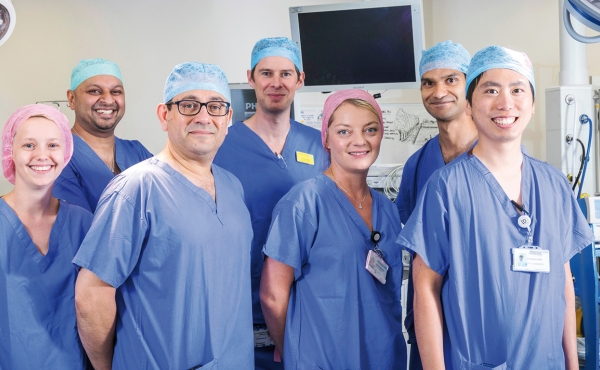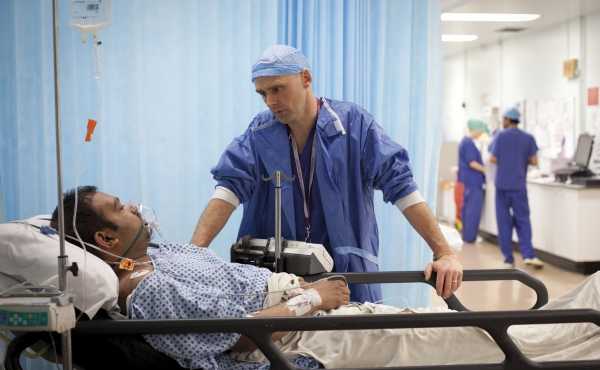Children's Acute Surgical Abdomen Programme (CASAP)
Children's Acute Surgical Abdomen Programme (CASAP)
CASAP was the first paediatric research initiative from the CR&I and RCoA. The study aimed to characterise the type and quality of care being delivered to children undergoing urgent or emergency abdominal surgery, including appendicectomy.

CASAP was funded by the Association of Paediatric Anaesthetists & delivered in collaboration with the British Association of Paediatric Surgeons and was sponsored by University College London Hospital
CASAP: Project Outline
CASAP aimed to characterise the type and quality of care being delivered to children undergoing urgent / emergency abdominal surgery (including appendicectomy). CASAP was a prospective observational cohort study launched in January 2019 and closed in January 2022.
CASAP enrolled all children between the ages of 12 months and 16 years who underwent an emergency abdominal surgical procedure during the study period.
CASAP was a consenting research study, which was adopted onto the NIHR portfolio as a result of generous funding from the Association of Paediatric Anaesthetists. CASAP was delivered in collaboration with the Association of Paediatric Anaesthetists and the British Association of Paediatric Surgeons and is sponsored by University College London Hospital.
CASAP aimed to review the type and quality of care provided to children undergoing emergency abdominal surgery in the United Kingdom. In doing so we hope to measure baseline compliance against evidence-based recommendations and identify variations in care between individual UK hospitals.
This study will test the feasibility of gathering and analysing such data with a view to establishing a longer term national quality improvement programme for this high-risk patient group. An additional aim of this study is to develop a risk-adjustment model for children having this kind of surgery.
There is a recognised gap in the quality of care delivered to elective and emergency surgical patients: this has been highlighted as a priority for health services research by patients and clinicians. The care provided to adults undergoing emergency abdominal surgery has been the focus of a comprehensive national effort to quality assure clinical practice, identify variation between institutions and in so doing, improve patient outcomes.
Deficiencies in the quality of emergency surgical care provided to children were highlighted in a NCEPOD report in 2011 and more recent evidence suggests that whilst there has been a reduction in the number of some emergency procedures undertaken, this has been accompanied by an increase in the overall incidence of adverse outcomes. As a result, paediatric emergency general surgery has been identified by the Association of Paediatric Anaesthetists and the British Association of Paediatric Surgeons as a priority area for quality assurance and quality improvement, but until now, there has been no consolidated national effort to measure or report processes and outcomes in this patient group.
CASAP was a prospective observational cohort study with one main component:
- Main patient study
All patients in participating hospitals who met our inclusion criteria were invited to participate. The aim was to collect quality and outcome data on all patients (aged 1 - 16 years on the day of surgery) undergoing emergency abdominal surgery in UK hospitals whose parents had provided informed consent. The aim was to measure postoperative morbidity during the inpatient stay and will establish longer term outcomes in these children by linking prospectively collected in-hospital data and longer-term hospital episode statistics and mortality data held by NHS Digital.
Additionally, an organisational questionnaire for each hospital was completed to describe structure and process in those institutions. The survey was designed using structural indicators identified in a systematic review and were refined using a modified Delphi process. We invited all UK hospitals who perform emergency abdominal surgery in children to participate and disseminated the survey via email. It ran from January 2019 to March 2020. We identified 198 UK hospitals who would perform emergency abdominal surgery in children and received 136 completed surveys - a 69% response rate
CASAP was a research project, and as such, underwent ethical review and received approval from HRA/Health and Care Research Wales (HCRW).
CASAP aimed to:
- Measure compliance against process measures which have been recommended for the delivery of clinical care to children undergoing emergency abdominal surgery in the U.K. 2.
- Develop and internally validate a risk prediction/adjustment tool for paediatric emergency abdominal surgery using a comprehensive paediatric U.K. sample. 3.
- Determine the feasibility of a longer term national QI programme in this patient group
CASAP Research Objectives were:
- Collect quality and outcome data on paediatric patients whose parents have provided informed consent, undergoing emergency abdominal surgery in all UK hospitals
- Measure and analyse patient-level estimates of perioperative risk using previously identified risk factors, to develop and internally validate a risk-prediction model for children’s emergency abdominal surgery
- Hospital Level Criteria:
All NHS hospitals which provide care to children who may require emergency abdominal surgery were eligible to take part.
- Patient Level Criteria:
Children between 12 months and 16 years of age undergoing unplanned abdominal surgery, where the preoperative diagnosis was considered to be related to a non-traumatic bowel (including appendix), hepatobiliary, and/or splenic pathology. Unplanned was defined as non-elective (i.e. the patient presented requiring emergency or urgent intervention, either as a primary presentation or as a complication of previous surgery). Surgery is defined as a procedure undertaken by a surgeon in an operating theatre requiring the support of an anaesthetist. Any surgical approach (e.g. open, laparoscopic, robotic assisted etc) was also acceptable.
- Patients / parents who do not provide consent. Children <12 months old on day of surgery, elective procedures, operations where the preoperative indication for surgery was considered to be traumatic, urological or gynaecological in origin, organ transplants, insertion/removal of dialysis catheters, interventional radiology procedures and Caesarean sections. Herniotomies are also excluded if the procedure does not involve access to the intra-abdominal cavity.
Under the supervision of the Principal Investigator (PI) and Local Investigator (LIs) at each hospital were responsible for the data collection and administration of consent, recruitment and data collection.
- Consent
Data was collected on all patients who met the inclusion criteria and whose parent/legal guardian provided consent.
The parents of children aged between 1 year and 16 years on the planned or actual date of surgery were approached in person or via the telephone to provide informed consent to participate. Patients were first identified by research nurses or by clinical nurses, emergency medicine doctors, critical care specialists, anaesthetists and/or surgeons involved in their care. Potential participants were provided with a participant information sheet in person or via email or post (one for the parent/legal guardian and, where appropriate, one for the child aged 10 - 15 years old). They were given at least one hour to consider the information provided before the adult was approached for informed consent.
- Data collection
- Once consent had been completed, demographics, medical and surgical details of the patient were recorded. Each participant was assessed for frailty using the Clinical Frail Scale and the reported Edmonton Frail Scale. After their operation, details were recorded about their intraoperative care. If a participant was discharged from hospital, then no further follow up happened until 4 months post discharge.
- If a participant remained in hospital, they were assessed on days 1 and 3 for delirium and days 3 and 7 for postoperative morbidity. The delirium assessment was a review of the patients medical and nursing notes for delirium trigger words (provided by the SNAP 3 team) and a 4AT/CAM-ICU assessment. The postoperative morbidity assessment was carried out using the Post-Operative Morbidity Survey (POMS) (with appropriate versions for cardiac and fractured neck of femur surgery).
- At 4 months postoperatively, participants were contacted via email or telephone (their preference) so that we could look at their quality of life after discharge. The EQ-5D-5L and EQ-VAS was used to provide a validated measure of their quality of life. All data was securely entered into the REDCap system.
A big thank you to all the PI's and Local Investigators who took part in CASAP. You can click here to find a list of all collaborators.
Participating Sites
England
Airedale NHS Foundation Trust
- Airedale General Hospital
Ashford & St Peters NHS Foundation Trust
- St Peter's Hospital
Barnsley Hospital NHS Foundation Trust
- Barnsley Hospital
Barts Health NHS Trust
- Newham University Hospital
Birmingham Women's and Children's NHS Foundation Trust
- Birmingham Children's Hospital
Blackpool Teaching Hospitals NHS Foundation Trust
- Blackpool Victoria Hospital
Bolton Hospital NHS Foundation Trust
- Royal Bolton Hospital
Bradford Teaching Hospitals NHS Foundation Trust
- Bradford Royal Infirmary
Brighton and Sussex University Hospitals NHS Trust
- Royal Alexandra Children's Hospital
Calderdale and Huddersfield NHS Foundation Trust
- Huddersfield Royal Infirmary
Chelsea and Westminster Hospital NHS Foundation Trust
- Chelsea and Westminster Hospital
- West Middlesex University Hospital
Chesterfield Royal Hospital NHS Foundation Trust
- Chesterfield Royal Hospital
County Durham and Darlington NHS Foundation Trust
- University Hospital of North Durham
Croydon Health Services NHS Trust
- Croydon University Hospital
Dorset County Hospital NHS Foundation Trust
- Dorset County Hospital
East Kent Hospitals University NHS Foundation Trust
- Queen Elizabeth The Queen Mother Hospital
- William Harvey Hospital
East Lancashire Hospitals NHS Trust
- Burnley General Teaching Hospital
- Royal Blackburn Teaching Hospital
East Suffolk and North Essex NHS Foundation Trust
- Colchester General Hospital
- Ipswich Hospital
Epsom and St Helier University Hospitals NHS Trust
- St Helier Hospital
Gloucestershire Hospitals NHS Foundation Trust
- Cheltenham General Hospital
- Gloucestershire Royal Hospital
Great Western Hospitals NHS Foundation Trust
- Great Western Hospital
Hampshire Hospitals NHS Foundation Trust
- Basingstoke and North Hampshire Hospital
- Royal Hampshire County Hospital
Homerton University Hospital NHS Foundation Trust
- Homerton University Hospital
Hull and East Yorkshire Hospitals NHS Trust
- Hull Royal Infirmary
Isle of Wight NHS Trust
- St Mary's Hospital, Isle of Wight
Kettering General Hospital NHS Foundation Trust
- Kettering General Hospital
King's College Hospital NHS Foundation Trust
- King's College Hospital
- Orpington Hospital
- Princess Royal University Hospital
Lancashire Teaching Hospitals NHS Foundation Trust
- Chorley and South Ribble District General Hospital
- Royal Preston Hospital
Leeds Teaching Hospitals NHS Trust
- Leeds Children's Hospital
London North West Healthcare NHS Trust
- Northwick Park Hospital
- St Mark's Hospital
Maidstone and Tunbridge Wells NHS Trust
- Tunbridge Wells Hospital, Pembury
Manchester University NHS Foundation Trust
- Royal Manchester Children's Hospital
Mid Essex Hospital Services NHS Trust
- Broomfield Hospital
Northern Devon Healthcare NHS Trust
- North Devon District Hospital
Pennine Acute NHS Trust
- Royal Oldham Hospital
Plymouth Hospitals NHS Trust
- Derriford Hospital
Royal Berkshire NHS Foundation Trust
- Royal Berkshire Hospital
Royal Brompton and Harefield NHS Foundation Trust
- Royal Brompton Hospital
Royal Cornwall Hospitals NHS Trust
- Royal Cornwall Hospital
Royal Devon and Exeter NHS Foundation Trust
- Royal Devon and Exeter Hospital
Royal Free London NHS Foundation Trust
- Royal Free Hospital
Royal United Hospitals Bath NHS Trust
- Royal United Hospital
Salisbury NHS Foundation Trust
- Salisbury District Hospital
Sheffield Children's NHS Foundation Trust
- Sheffield Children's Hospital
South Tees Hospitals NHS Foundation Trust
- The James Cook University Hospital
South Warwickshire NHS Foundation Trust
- Warwick Hospital
St George's Healthcare NHS Trust
- St George's Hospital
Stockport NHS Foundation Trust
- Stepping Hill Hospital
Surrey and Sussex Healthcare NHS Trust
- Crawley Hospital
- East Surrey Hospital
Taunton and Somerset NHS Foundation Trust
- Musgrove Park Hospital
The Dudley Group NHS Foundation Trust
- Russells Hall Hospital
The Newcastle upon Tyne Hospitals NHS Foundation Trust
- Royal Victoria Infirmary
The Queen Elizabeth Hospital Kings Lynn NHS Trust
- The Queen Elizabeth Hospital, Kings Lynn
The Rotherham NHS Foundation Trust
- Rotherham Hospital
Torbay and South Devon NHS Foundation Trust
- Torbay Hospital
United Lincolnshire Hospitals NHS Trust
- Lincoln County Hospital
- Pilgrim Hospital
University College London Hospitals NHS Foundation Trust
- University College Hospital
University Hospital Southampton NHS Foundation Trust
- Southampton General Hospital
University Hospitals Coventry and Warwickshire NHS Trust
- University Hospital Coventry
University Hospitals of North Midlands NHS Trust
- Royal Stoke University Hospital
West Hertfordshire Hospitals NHS Trust
- Watford General Hospital
Wales
Abertawe Bro Morgannwg University Health Board
- Morriston Hospital
- Singleton Hospital
Betsi Cadwaladr University Health Board
- Wrexham Maelor Hospital
Cwm Taf Health Board
- Princess of Wales Hospital
Hywel Dda Health Board
- Glangwili General Hospital
Scotland
NHS Ayrshire & Arran
- University Hospital Crosshouse
NHS Borders
- Borders General Hospital
NHS Fife
- Victoria Hospital, Kirkcaldy
NHS Grampian
- Royal Aberdeen Children's Hospital
NHS Greater Glasgow & Clyde
- Royal Alexandra Hospital
NHS Highland
- Lorn and Islands Hospital
NHS Lanarkshire
- Hairmyres Hospital
- Wishaw General Hospital
NHS Lothian
- Royal Hospital for Sick Children, Edinburgh
- St John's Hospital
NHS Shetland
- Gilbert Bain Hospital
Northern Ireland
Northern Health and Social Care Trust
- Causeway Hospital
Western Health and Social Care Trust
- South West Acute Hospital
Click Here to access the CASAP Study Documents including the protocol and ethics documents.
CASAP Publications
-
Structural Indicators of quality care for children undergoing emergency abdominal surgery
-
Read the first paper from the Children's Acute Surgical Abdomen Programme (CASAP) Risk factors for complications after emergency surgery for paediatric appendicitis: a national prospective observational cohort study



